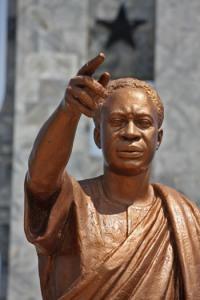By Ken Maguire

Kwame Nkrumah mausoleum
Awuah has entertained many offers to build or lead other schools, but for now, he says, “we will not attempt to replicate (Ashesi) unless we think we are ready.” He’s saved every document, including the original business plan, in hope of writing a book.
Africa’s rich and powerful are almost as easy to spot as its ubiquitous poor. Many of them shuttle to and from work and around towns like Accra, Ghana, in shiny chauffeured cars and oversized SUVs.
That’s not how Patrick Awuah ’89 rolls. The man who wants to revolutionize how Africa educates its future chief executives of government and business—he’s spent $700,000 of his own money doing it—drives himself to work in a 1999 Honda CR-V, looking more like a suburban dad than a mover or shaker.
Awuah has been doing things differently since he launched Ashesi University College nearly eight years ago in Accra, his hometown. It’s become a model for the fast-growing number of private universities in sub-Saharan Africa.
Forty percent of Ashesi’s 450 students receive some financial aid, something that underfunded and overcrowded public universities can’t afford to give. At its core is a liberal arts education, inspired by Awuah’s experience at Swarthmore, that challenges students to think critically. On a hilltop north of the city, a new campus is under construction and Awuah has been fielding calls about launching similar schools around Africa.
It’s not a stretch to say that the 44-year-old Awuah stands as a new model for African leadership. A glance around the continent finds political leaders rewriting constitutions and rigging elections to maintain their grip on power. When’s the last time you heard any of them say something like: “I do need to think about succession planning. I’m not going to be president of this institution forever. It is fair to say that we’ll need to get this institution to a certain place and I need to have the courage and the grace to step aside and let the institution really grow up, without its founder.”
Or this: “We need to make sure that this is not an institution that is about Patrick.”
Ghana’s Ashesi University opened in 2002 with 30 students. In 2009, University President Patrick Awuah (front row, second from left) helped break ground for a new campus that will eventually accommodate 2,000 students. The university, which follows a liberal arts model for the first two years, graduates students with majors in business administration, computer science, and management information systems—all skills in demand in the developing world.
In 1985, Ghana was economically crippled under a military dictatorship. Swarthmore accepted Awuah on a near-full scholarship, requiring that he pay just $400. But his family couldn’t afford it, prompting the U.S. Embassy—the same embassy that today calls him for advice—to initially reject his application for a visa. Swarthmore fixed the problem by giving him a full scholarship. He double-majored—economics and engineering—landed a job working for Bill Gates, and, at Microsoft, he met future wife Rebecca, a software testing engineer.
That’s a success story by any measure, but 14 years ago, their life changed with the birth of their first child, Nanayaw, recounts Rebecca Awuah, who now teaches calculus at Ashesi. They also have a 7-year-old daughter, Efia.
“That was a transition period for us, becoming parents,” she says from her office. “For Patrick, the real strong realization was that the negative image of what’s going on in Africa influences the self-perception of everyone of African descent. He felt that in addition to doing something for his country—by trying to educate people to be better leaders and solve some of the big problems we have in Africa—that improvement here would also influence the self-perception of the diaspora.”
So he left Microsoft and enrolled at Berkeley’s Haas School of Business. In 1998, he and a team of friends traveled to Ghana to complete a feasibility study on creating a private university. He wrote Ashesi’s business plan for his M.B.A. thesis. Classmate Nina Marini co-founded the school. She’s now a trustee.
To read the full article, please click here.
